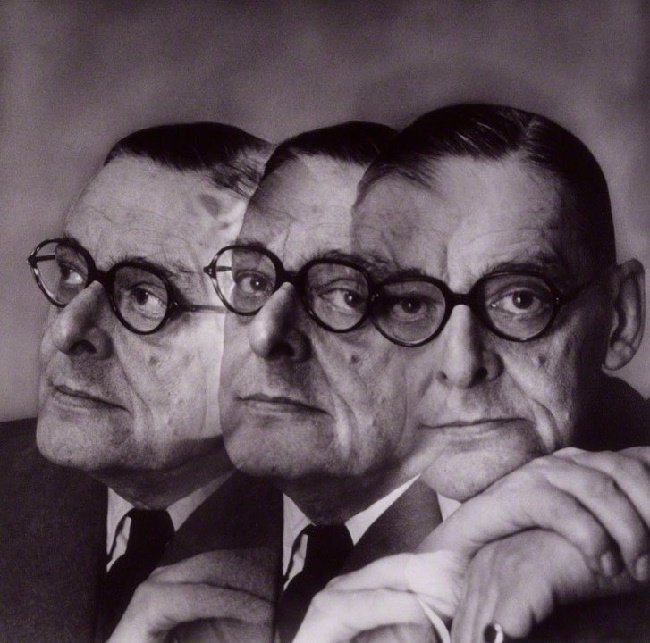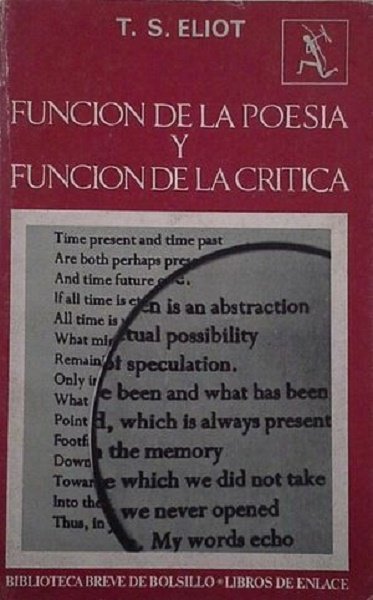Se cumplen 60 años de la muerte de uno de los más influyentes escritores en la poesía contemporánea, Thomas Stearns Eliot, quien falleciera el 4 de enero de 1965. T. S. Eliot, como suele identificarse, fue un poeta, dramaturgo y ensayista nacido en Estados Unidos en 1888, que obtuvo la nacionalización como británico en 1927, luego de residenciarse en Inglaterra en 1915. Estudió en Harvard, en la Sorbona y en Oxford. Recibió el Premio Nobel en 1948. Entre sus principales libros de poesía puedo nombrar Prufrock y otras observaciones (1917), La tierra baldía ¬-su gran obra¬- (1922), Cuatro cuartetos (1944). Como ensayista publicó libros de gran relevancia, como Tradición y talento individual (1920), Función de la poesía y función de la crítica (1933), Notas sobre la definición de cultura (1948), Tres voces de la poesía (1954).

En años pasados publiqué posts sobre este autor, como este en la anterior plataforma, y en esta he hecho alusión a él en varios posts, como el publicado ayer (ver aquí). Esta vez quiero detenerme, brevemente, en parte de su concepción de la poesía, tomando citas de su libro Función de la poesía y función de la crítica, que comentaré al final.
La ordenación es tan necesaria como la inspiración. (…) Una y otra vez, al emplear una palabra, le dará un nuevo sentido o extraerá otro latente, una y otra vez, la metáfora justa, saturada mientras yacía en el hondón de su memoria (…)
(…) no más que una parte de las imágenes de un poeta proceden de sus lecturas; proceden de su entera vida sensitiva desde la más temprana niñez.
Las dificultades de una poesía (y la poesía moderna generalmente se considera difícil) pueden deberse a una de varias razones. Primero, a causas personales que hacen imposible al poeta el expresarse en un modo que no sea oscuro.

El lector más sazonado, aquel que ha alcanzado un grado de mayor pureza, no se molesta acerca de entender o no; por lo menos, no al principio.
(…) debemos escribir poesía como podamos y tomarla como la hallemos.
La poesía empieza, diría yo, con un salvaje tocando el tambor en una selva, y retiene siempre ese elemento esencial de la percusión y el ritmo (…)
(La poesía), desde luego, no puede definirse por las funciones que cumple: si conmemora un acontecimiento histórico, celebra una solemnidad, decora un rito religioso o divierte a una muchedumbre, mejor que mejor; lleva a cabo, además, esas revoluciones de la sensibilidad que son periódicamente necesarias, ayuda a romper los modos convencionales de percepción y valoración que sin cesar se forman; de tiempo en tiempo puede hacernos un poco más conscientes de los profundos e innominados sentimientos que forman el sustrato de nuestro ser y hasta los cuales calamos raramente, pues nuestras vidas son una continua evasión del mundo visible y sensible. Pero decir esto es decir lo que ya sabéis, si habéis sentido la poesía y meditado acerca de vuestros sentimientos.
Reuní varios escuetos fragmentos del texto “Conclusión” que Eliot pone al final del conjunto de conferencias sobre poetas, poesía y crítica del libro señalado. Por supuesto, se trata de citas de diversos aspectos temáticos. Pero podemos advertir la agudeza del escritor británico-estadounidense al abordar este complejo asunto. Destaco el valor principal que da a la elaboración, sin negar el papel de la llamada “inspiración”, y a esa fuente nutricia que puede ser la infancia. Igualmente, el reconocimiento de esa condición del poeta que le llevará a hacer una poesía de difícil interpretación, función que deberá cumplir el lector avezado sin violentar el texto. Finalmente, me gustaría poner de relieve esa visión tan amplia que concibe acerca de la función posible de la poesía, donde destacaría la consideración acerca de su sentido transgresor y renovador de conceptos y formas, y la asunción discreta de nuestra profunda sensibilidad.
Referencias | References:
Eliot, T. S. (1968). Función de la poesía y función de la crítica. España: Edit. Seix Barral.
https://es.wikipedia.org/wiki/T._S._Eliot
https://en.wikipedia.org/wiki/T._S._Eliot
Click here to read in english
T. S. Eliot and reflection on poetry
60 years have passed since the death of one of the most influential writers in contemporary poetry, Thomas Stearns Eliot, who died on January 4, 1965. T. S. Eliot, as he is often identified, was a poet, playwright and essayist born in the United States in 1888, who obtained British nationality in 1927, after settling in England in 1915. He studied at Harvard, the Sorbonne and Oxford. He received the Nobel Prize in 1948. Among his main books of poetry I can name Prufrock and Other Observations (1917), The Waste Land -his great work- (1922), Four Quartets (1944). As an essayist he published books of great relevance, such as Tradition and Individual Talent (1920), Function of Poetry and Function of Criticism (1933), Notes on the Definition of Culture (1948), Three Voices of Poetry (1954). In past years I published posts about this author, such as this one on the previous platform, and in this one I have made reference to him in several posts, such as the one published yesterday (see here). This time I want to briefly dwell on part of his conception of poetry, taking quotes from his book Function of poetry and function of criticism, which I will comment on at the end.
Ordering is as necessary as inspiration. (…) Again and again, in using a word, he will give it a new meaning or draw out another latent one, again and again, the right metaphor, saturated as it lay in the depths of his memory (…)
(…) no more than a part of a poet's images come from his reading; they come from his whole sensitive life from earliest childhood.
The difficulties of a poem (and modern poetry is generally considered difficult) may be due to one of several reasons. First, to personal causes which make it impossible for the poet to express himself in any way other than obscure.
The more seasoned reader, one who has reached a higher degree of purity, does not bother about whether he understands or not; at least, not at first.
(…) we must write poetry as we can and take it as we find it.
Poetry begins, I would say, with a savage playing a drum in a forest, and it always retains that essential element of percussion and rhythm (…)
(Poetry), of course, cannot be defined by the functions it performs: if it commemorates a historical event, celebrates a solemnity, decorates a religious rite or entertains a crowd, all the better; it also brings about those revolutions of sensibility that are periodically necessary, it helps to break the conventional modes of perception and evaluation that are constantly forming; from time to time it can make us a little more aware of the deep and nameless feelings that form the substratum of our being and which we rarely penetrate, because our lives are a continuous evasion of the visible and sensible world. But to say this is to say what you already know, if you have felt poetry and meditated on your feelings.
I have gathered several brief fragments from the text “Conclusion” that Eliot puts at the end of the set of lectures on poets, poetry and criticism of the book mentioned. Of course, these are quotes from various thematic aspects. But we can see the British-American writer's insight in approaching this complex issue. I would like to highlight the main value he gives to elaboration, without denying the role of the so-called "inspiration" and to that nourishing source that childhood can be. Likewise, the recognition of that condition of the poet that will lead him to create poetry that is difficult to interpret, a function that the experienced reader must fulfill without doing violence to the text. Finally, I would like to highlight that very broad vision he conceives about the possible function of poetry, where I would highlight the consideration of its transgressive and renewing sense of concepts and forms, and the discreet assumption of our deep sensitivity.





